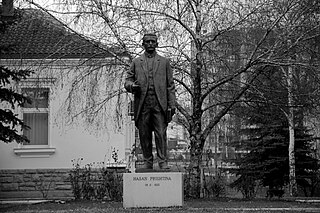
The Kosovo Force (KFOR) is a NATO-led international peacekeeping force and military of Kosovo. KFOR is the third security responder, after the Kosovo Police and the EU Rule of Law (EULEX) mission, respectively, with whom NATO peacekeeping forces work in close coordination. Its operations are gradually reducing until the Kosovo Security Force, established in 2009, becomes self-sufficient.

The Kosovo Police is the national policing law enforcement agency of Kosovo. It was established in 1999 and took its current form with the 2008 police law. It consists of five departments and eight regional directorates and is represented at the political level by the Ministry of Internal Affairs and Public Administration of the Republic of Kosovo.

The Self-Determination Movement, abbr.: LVV or VV), also known in English as Vetëvendosje, is a left-leaning social democratic political party in Kosovo. It is a member of the Progressive Alliance, and an observer in the Party of European Socialists, and the Socialist International.

The University of Pristina is a public university located in Pristina, Kosovo. It is the institution that emerged after the disestablishment of the University of Pristina (1969–1999) as a result of the Kosovo War. The inauguration of the university was a historical occurrence not only for the people of Kosovo, but for the whole Albanian nation. On 15 February, the solemn Parliament session took place, which is also proclaimed as The University of Pristina's Day. In the composition of the newly established University of Pristina were faculties with their headquarters in Pristina: the Faculty of Philosophy, Faculty of Law and Economics, Faculty of Engineering and Faculty of Medicine. Now the University of Pristina has 17 faculties, of which 14 are academic faculties and 3 are faculties of applied sciences. Contained within the emblem is a translation of the name into Latin, Universitas Studiorum Prishtiniensis.

Kosovo is a developing country with an economy that functions on the principles of the free market, with a large private sector. Kosovo is an upper-middle income economy according to the World Bank, and is a member of the World Bank and the International Monetary Fund. Its official currency is the euro.

The European Union Rule of Law Mission in Kosovo, known as EULEX Kosovo or simply as EULEX, is the largest civilian mission ever launched under the Common Security and Defence Policy (CSDP) of the European Union. EULEX supports selected Kosovo rule of law institutions on their path towards increased effectiveness, sustainability, multi-ethnicity and accountability, free from political interference and in full compliance with international human rights standards and best European practices.
The 2008 Kosovo declaration of independence, which proclaimed the Republic of Kosovo to be an independent and sovereign state, was adopted at a meeting held on 17 February 2008 by 109 out of the 120 members of the Assembly of Kosovo, including the Prime Minister of Kosovo, Hashim Thaçi, and by the President of Kosovo, Fatmir Sejdiu. It was the second declaration of independence by Kosovo's Albanian-majority political institutions; the first was proclaimed on 7 September 1990.

Lesbian, gay, bisexual, transgender, and queer (LGBTQ) rights in Kosovo have improved in recent years, most notably with the adoption of the new Constitution, banning discrimination based on sexual orientation. Kosovo remains one of the few Muslim-majority countries that hold regular pride parades.

The 2008 unrest in Kosovo followed Kosovo's declaration of independence on February 17, 2008. Some Kosovo Serbs opposed to secession boycotted the move by refusing to follow orders from the central government in Pristina and attempted to seize infrastructure and border posts in Serb-populated regions. There were also sporadic instances of violence against international institutions and governmental institutions, predominantly in North Kosovo.
The Ahtisaari Plan, formally the Comprehensive Proposal for the Kosovo Status Settlement (CSP), is a status settlement proposed by former President of Finland Martti Ahtisaari covering a wide range of issues related to the status of Kosovo.

Kosovo unilaterally self proclaimed independence from Serbia in 2008, a move which Serbia strongly rejects. Serbia has not recognized Kosovo as an independent state and continues to claim it as the Autonomous Province of Kosovo and Metohija. However, differences and disputes remain, while North Kosovo partially remains under Serbian influence. Initially there were no relations between the two; but in the following years there has been increased dialogue and cooperation between the two sides.

The A1, also commonly Rruga e Kombit or SH10, is the longest and only toll motorway in Albania, stretching 114 kilometres (71 mi) in the counties of Lezhë and Kukës. It consists for the most part of two traffic lanes and an emergency lane in each driving direction separated by a central reservation.
The Belgrade–Pristina negotiations are a series of European Union-facilitated talks between the governments of Serbia and Kosovo. Serbia claims Kosovo as its southern province under United Nations administration, and rejects its independence. Kosovo considers Serbia as a neighbouring state. The negotiations began in March 2011, three years after Kosovo declared independence. They are the first negotiations between the two entities since Kosovo declared independence in February 2008.

The University of Pristina was founded in the Socialist Autonomous Province of Kosovo, Socialist Republic of Serbia, Yugoslavia, in the city of Pristina, for the academic year 1969–1970 and functioned until 1999. However, owing to political upheaval, war, successive mutual expulsions of faculty of one ethnicity or the other, and resultant pervasive ethnic-based polarisation, there came to be two disjoint institutions using the same name, albeit idiosyncratically to reflect ethnic identity. Albanian-language activity continues at the original location, whilst the Serbian-language University of Priština has relocated to North Mitrovica, where it maintains its place within the Serbian education system.

Ivan Yordanov Kostov is a Bulgarian politician who served as Prime Minister of Bulgaria from 1997 to 2001. A member of the SDS party, which he led from 1994 to 2001, he was previously Minister of Finance from 1990 to 1992. Following his premiership, Kostov founded a new political party, the DSB, and served as Member of the National Assembly from 2001 to 2013.

The mass media in Kosovo consists of different kinds of communicative media such as radio, television, newspapers, and internet web sites. Most of the media survive from advertising and subscriptions.
In March and April 1981, a student protest in Pristina, the capital of the then Socialist Autonomous Province of Kosovo, led to widespread protests by Kosovo Albanians demanding more autonomy within the Socialist Federal Republic of Yugoslavia. The Presidency of Yugoslavia declared a state of emergency in Pristina and Kosovska Mitrovica, which led to rioting. The unrest was suppressed by a large police intervention that caused numerous casualties, and a period of political repression followed.
In early 2014, Kosovo media accused rector Ibrahim Gashi of the University of Pristina and his staff of falsifying research and publishing scientific papers based on that research to bolster their academic credentials. Student protesters were angered after the Assembly failed to pass a vote demanding Gashi's resignation, with a coalition of governmental political parties opposing the move. A spokeswoman for the Kosovo police said that violence began when students began throwing red paint and rocks at responding officers, who then attempted to subdue them with tear gas. Reports state that Thirty police officers were reportedly injured, one with a head injury and several with broken arms or legs. More than 30 students and opposing politicians were arrested.

Pristina is the capital of the Republic of Kosovo. Being so, Pristina's transport forms the hub of road, rail and air networks in Kosovo. The city's buses, trains and planes together all serve to maintain a high level of connectivity between Pristina many different districts and beyond. An analysis by the Traffic Police has shown that from 240,000 cars registered in Kosovo, around 100,000 cars are from the District of Pristina.

Education in Pristina, the capital of Kosovo, consists of primary, secondary and higher education. Pristina houses a number of public and private institutions, such as the University "Hasan Prishtina", the National Library of Kosovo, and the Academy of Sciences and Arts of Kosovo. Throughout the last century Pristina has attracted a considerable number of students from Kosovo. Today, the city of Pristina hosts a large number of intellectuals, professors, academics, students, and professionals in various spheres.














